Les Miserables
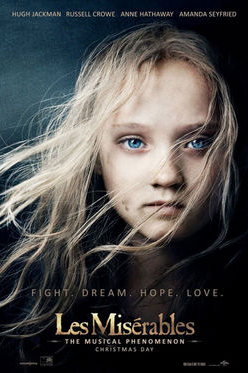
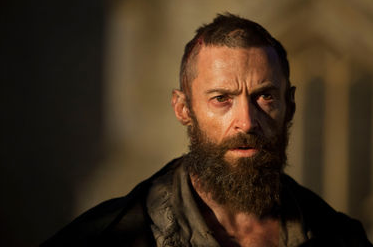 Now, Hooper is a fine director. His work on The King's Speech was rightfully praised. And yet, I have mixed feelings on the job he has done here. Let's look at what he does right, first. He does a good job of "opening up" the famous stage musical by Claude-Michel Schonberg and Alain Boublil, and making it feel like a movie, instead of a filmed version of the play. His well-publicized decision to have the actors sing live on the set, instead of lip-synching (which is standard on a movie musical) also pays off, thanks to his talented cast. Are some actors better singers than others? Definitely. But his gamble is not what brings the film down. He also gives the film a glorious look, with wide open settings, and a 19th Century French village that seems to span for miles. At least that's what it looked like during the precious moments I could see it. That brings me to where I become divided, and to my key problem.
Now, Hooper is a fine director. His work on The King's Speech was rightfully praised. And yet, I have mixed feelings on the job he has done here. Let's look at what he does right, first. He does a good job of "opening up" the famous stage musical by Claude-Michel Schonberg and Alain Boublil, and making it feel like a movie, instead of a filmed version of the play. His well-publicized decision to have the actors sing live on the set, instead of lip-synching (which is standard on a movie musical) also pays off, thanks to his talented cast. Are some actors better singers than others? Definitely. But his gamble is not what brings the film down. He also gives the film a glorious look, with wide open settings, and a 19th Century French village that seems to span for miles. At least that's what it looked like during the precious moments I could see it. That brings me to where I become divided, and to my key problem.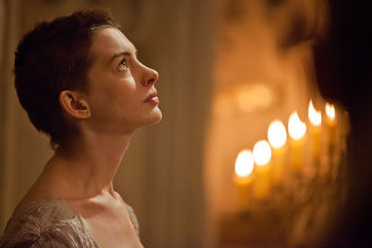 In staging Les Miserables, Hooper has decided to shoot almost all of the musical numbers in very tight close up. Not only is this distracting, but it robs the audience of the hard work that obviously went into the set and production design. Occasionally, the camera will move or swoop around the actor while they are singing, and this is not much better. Surely there must be another way to make us focus on the singing of the actors, with not having the camera constantly up in their face the entire time. The editing is also strange. Sometimes, it seems like the camera can't stay on a single image for more than three seconds. Other times, it holds on a certain image or actor too long. He also seems to have a problem with having more than one actor on screen at a time, so the editing bounces back and forth between one person and the other. It's needlessly distracting, and makes you wonder why no one spoke up while the dailies were being shown.
In staging Les Miserables, Hooper has decided to shoot almost all of the musical numbers in very tight close up. Not only is this distracting, but it robs the audience of the hard work that obviously went into the set and production design. Occasionally, the camera will move or swoop around the actor while they are singing, and this is not much better. Surely there must be another way to make us focus on the singing of the actors, with not having the camera constantly up in their face the entire time. The editing is also strange. Sometimes, it seems like the camera can't stay on a single image for more than three seconds. Other times, it holds on a certain image or actor too long. He also seems to have a problem with having more than one actor on screen at a time, so the editing bounces back and forth between one person and the other. It's needlessly distracting, and makes you wonder why no one spoke up while the dailies were being shown.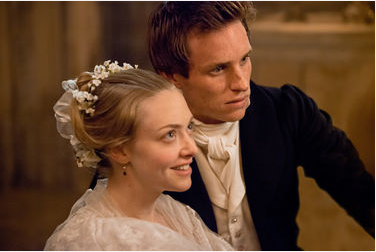 Maybe it's a testament to the stage musical (and the original novel by Victor Hugo) that despite this glaringly bad decision, the movie still works. By now, just about everybody has either heard of the musical, or at least heard one of its songs. Heck, you probably already know what you think about it. This is as Critic-Proof a movie as there has ever been. What's surprising is how long it's taken this musical to reach the cinema. Not that Hollywood hasn't been trying - There's been at least one screen version of the musical stuck in Development Hell since the early 1990s. During that time, we had two non-musical adaptations of the story hit the screen. (One, a well-received modern day re-invention, and the other a more straight-forward adaptation with Liam Neeson that is hardly remembered today.) The musical film is the one that most people have been waiting for, however. Now that it's here, I have to say that the built-in audience is sure to appreciate its faithfulness, and its ability to streamline the story and the songs just a little bit, without losing any of the dramatic edge.
Maybe it's a testament to the stage musical (and the original novel by Victor Hugo) that despite this glaringly bad decision, the movie still works. By now, just about everybody has either heard of the musical, or at least heard one of its songs. Heck, you probably already know what you think about it. This is as Critic-Proof a movie as there has ever been. What's surprising is how long it's taken this musical to reach the cinema. Not that Hollywood hasn't been trying - There's been at least one screen version of the musical stuck in Development Hell since the early 1990s. During that time, we had two non-musical adaptations of the story hit the screen. (One, a well-received modern day re-invention, and the other a more straight-forward adaptation with Liam Neeson that is hardly remembered today.) The musical film is the one that most people have been waiting for, however. Now that it's here, I have to say that the built-in audience is sure to appreciate its faithfulness, and its ability to streamline the story and the songs just a little bit, without losing any of the dramatic edge.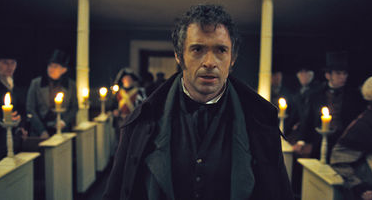 Just like the songs themselves, the story should be familiar by now, as well. We follow the life of a man named Jean Valjean (Hugh Jackman), whom we first meet as a convict in a Paris chain gang in 1815. He has served 19 years for stealing a loaf of bread to feed his family, and is paroled. However, finding that the world rejects him because of his criminal background, he breaks parole and changes his name and identity, vowing to lead a just and better life. Constantly on the run from the relentless Inspector Javert (Russell Crowe), who pursues him after breaking parole, Valjean has managed to allude capture, and successfully change his life, so that eight years later, we find that he is the mayor of a town, as well as a factory owner. His past catches up with him when he is forced to expose his true identity in order to help a prostitute named Fantine (Anne Hathaway), who is fatally ill, and has a child she can no longer care for. On her deathbed, Jean vows to raise the child as his own, and once again goes into hiding, continuing to avoid capture, while trying to lead a normal life for the small child, Cosette (Isabelle Allan).
Just like the songs themselves, the story should be familiar by now, as well. We follow the life of a man named Jean Valjean (Hugh Jackman), whom we first meet as a convict in a Paris chain gang in 1815. He has served 19 years for stealing a loaf of bread to feed his family, and is paroled. However, finding that the world rejects him because of his criminal background, he breaks parole and changes his name and identity, vowing to lead a just and better life. Constantly on the run from the relentless Inspector Javert (Russell Crowe), who pursues him after breaking parole, Valjean has managed to allude capture, and successfully change his life, so that eight years later, we find that he is the mayor of a town, as well as a factory owner. His past catches up with him when he is forced to expose his true identity in order to help a prostitute named Fantine (Anne Hathaway), who is fatally ill, and has a child she can no longer care for. On her deathbed, Jean vows to raise the child as his own, and once again goes into hiding, continuing to avoid capture, while trying to lead a normal life for the small child, Cosette (Isabelle Allan).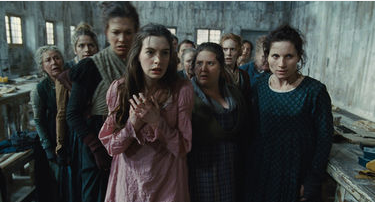 Flash forward yet another 10 years, and we find that Paris is on the verge of a revolution. Is is here that the now-adult Cosette (Amanda Seyfried) falls in love with a young student soldier named Marius (Eddie Redmayne). A love triangle of sorts forms, as another young woman named Eponine (Samantha Barks) is also in love with the young Marius. Is is here that the film carries over one of the original stage musical's most glaring faults - The romance between Cosette and Marius is completely unconvincing, due to the fact that they fall in love, despite knowing nothing about each other, and only having been around each other for five minutes. Somehow, this is enough to make both young lovers devote their entire lives to each other. The fact that Cosette pretty much disappears from this entire arc of the story until the end only furthers my suspicions that the original writers of the musical did not care much for her character, or the relationship. Regardless, war is looming, and Marius must decide if he will stand with his fellow revolutionaries, while Jean must face his own feelings about losing Cosette to this young man.
Flash forward yet another 10 years, and we find that Paris is on the verge of a revolution. Is is here that the now-adult Cosette (Amanda Seyfried) falls in love with a young student soldier named Marius (Eddie Redmayne). A love triangle of sorts forms, as another young woman named Eponine (Samantha Barks) is also in love with the young Marius. Is is here that the film carries over one of the original stage musical's most glaring faults - The romance between Cosette and Marius is completely unconvincing, due to the fact that they fall in love, despite knowing nothing about each other, and only having been around each other for five minutes. Somehow, this is enough to make both young lovers devote their entire lives to each other. The fact that Cosette pretty much disappears from this entire arc of the story until the end only furthers my suspicions that the original writers of the musical did not care much for her character, or the relationship. Regardless, war is looming, and Marius must decide if he will stand with his fellow revolutionaries, while Jean must face his own feelings about losing Cosette to this young man.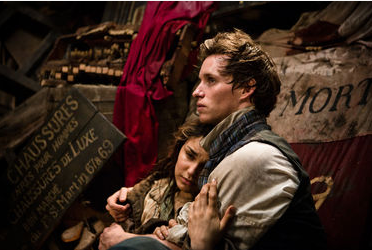 All of this is told with high melodrama, and big, grand production numbers that has made the musical famous (or infamous, depends on whom you talk to) for nearly 30 years. For all that Hooper did wrong in telling this story visually, he at least has found a talented cast to sing it. Even the actors who aren't as strong as they could have been (primarily Russell Crowe), there is no one who seems completely wrong for the role, such as the infamous casting of Gerard Butler as the Phantom of the Opera in that particular musical adaptation film. Of the cast, the ones who come across the strongest are Hugh Jackman (who has the most musical theater experience of the "name" actors), Anne Hathaway (who makes the most out of her small role, and guarantees that the 20 minutes or so of screentime she has are heartbreaking), Eddie Redmayne (from My Week with Marilyn, and is the biggest find here, musically), and Samantha Barks (who played the role in a London stage production, and is making her screen debut).
All of this is told with high melodrama, and big, grand production numbers that has made the musical famous (or infamous, depends on whom you talk to) for nearly 30 years. For all that Hooper did wrong in telling this story visually, he at least has found a talented cast to sing it. Even the actors who aren't as strong as they could have been (primarily Russell Crowe), there is no one who seems completely wrong for the role, such as the infamous casting of Gerard Butler as the Phantom of the Opera in that particular musical adaptation film. Of the cast, the ones who come across the strongest are Hugh Jackman (who has the most musical theater experience of the "name" actors), Anne Hathaway (who makes the most out of her small role, and guarantees that the 20 minutes or so of screentime she has are heartbreaking), Eddie Redmayne (from My Week with Marilyn, and is the biggest find here, musically), and Samantha Barks (who played the role in a London stage production, and is making her screen debut). 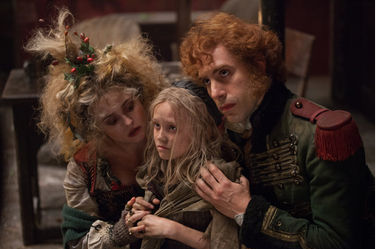 Rounding out the lead cast are Sacha Baron Cohen and Helena Bonham Carter, camping it up to heights unknown as the film's comic relief duo. There's also a new song that's been written for the film (for Oscar eligibility, no doubt) that is instantly forgettable, and the film probably would have been better off without. Fans of the stage show can also have some fun with the film's numerous cameos, including Colm Wilkinson, who played Valjean in the original London and Broadway casts, showing up as a Bishop early on. This is a movie that has been made well and is sung-well. It's only the bizarre direction and editing decisions I take issue with. What it all boils down to is that Les Miserables is a successful musical adaptation that needed someone else behind the camera.
Rounding out the lead cast are Sacha Baron Cohen and Helena Bonham Carter, camping it up to heights unknown as the film's comic relief duo. There's also a new song that's been written for the film (for Oscar eligibility, no doubt) that is instantly forgettable, and the film probably would have been better off without. Fans of the stage show can also have some fun with the film's numerous cameos, including Colm Wilkinson, who played Valjean in the original London and Broadway casts, showing up as a Bishop early on. This is a movie that has been made well and is sung-well. It's only the bizarre direction and editing decisions I take issue with. What it all boils down to is that Les Miserables is a successful musical adaptation that needed someone else behind the camera.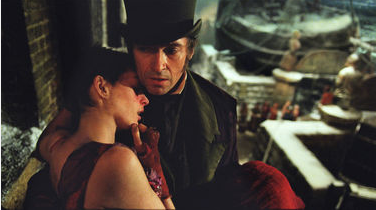
See the movie times in your area or buy the DVD at Amazon.com!






0 Comments:
Post a Comment
<< Home